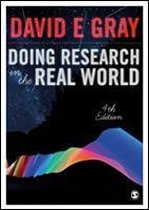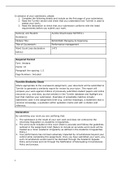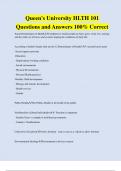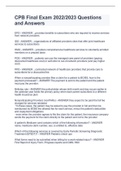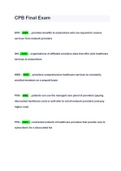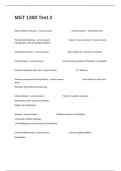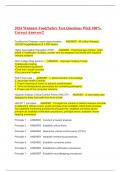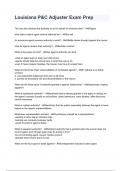Samenvatting van alle
verplichte literatuur voor de
colleges van het vak Research
Methods. Het omvat
samenvattingen van het boek
Doing Research in the Real
World, The Cochrane
Handbook en verschillende
artikelen.
Vrije Universiteit van
Amsterdam
SAMENVATTING RESEARCH
METHODS
Master Health Sciences
,Inhoudsopgave
Lecture 2 - Introduction to inter- and transdisciplinary perspective on HS research and research
questions................................................................................................................................................2
Lecture 4 - Measurement in Health Sciences part 1 and 2.....................................................................6
Lecture 6 - Qualitative Research methods choosing the right method..................................................9
Lecture 7 - Inter- and transdisciplinary research: engagement for understanding...............................24
Lecture 8 - Intervention design and evaluation in Health Sciences......................................................28
Lecture 9 - Evaluations of interventions - Experimental research: (non) regular parallel design of RCT
and alternatives....................................................................................................................................31
Lecture 11 - Qualitative data analyses..................................................................................................39
Lecture 13 - Systematic Reviews - part 1..............................................................................................42
1
,Lecture 2 - Introduction to inter- and
transdisciplinary perspective on HS research and
research questions
Book Doing Research in the Real World
Chapter 1 - Introduction
Research: systematic and organized effort to investigate a specific problem that needs a solution.
Action research: collaboration between the researcher and professional practitioners (for instance)
Research is influenced by sociology, psychology, anthropology, philosophy, communication,
economics and sponsors such as governments or businesses. Also, researchers have to gain access to
social settings of working environments.
A wise researcher gives equal attention to each of the research phases.
Theory: a set of interrelated constructs (concepts), definitions, and propositions that present a
systematic review of phenomena by specifying relations among variables, with the purpose of
explaining and predicting phenomena.
a theory should be predictive
The most satisfying and usable relationships are those that can be generalized.
Book Doing Research in the Real World
Chapter 2 – Theoretical Perspectives and research methodologies
Theoretical perspective before undertaking research (deductive) or after it (inductive).
Deductive approach moves towards hypothesis testing, after which the principle is confirmed,
refuted or modified.
Inductive approach plans are made for data collection, after which the data are analysed to see if
any patterns emerge that suggest relationships between variables. Is not totally without pre-existing
theories or ideas.
Inductive and deductive methods can be combined:
inductive method hypothesis/theory theory deductive method experimental design
Epistemology Theoretical Perspectives Methodology Methods
There is an inter-relationship between these factors, according to Crotty.
Ontology: the study of being, that is, the nature of existence and what constitutes reality.
Understanding what is.
Epistemology understanding what it means to know.
Positivism:
The world is independent of our knowledge of it – it exists ‘out there’.
Linked to objectivism.
Reality exists external to the researcher and must be investigated through the rigorous
process of scientific inquiry.
2
, Reality consists of what is available to the senses.
Inquiry should be based upon scientific observation, and therefore on empirical inquiry.
Formulating and testing hypotheses (deductive approach)
Quantitative methods
Interpretivism:
There are multiple realities and ways of accessing them.
Linked to constructivism and interpretivism.
Truth and meaning do not exist in some external world but are created by the subject’s
interactions with the world. Meaning is constructed not discovered.
There is no direct, one-to-one relationship between ourselves (subjects) and the world
(object). The world is interpreted through the classification schemas on the mind
Subjectivism: meaning does not emerge from the interplay between the subject and the outside
world but is imposed on the object by the subject. Subjects do construct meaning, but do so from
within collective unconsciousness, from dreams, from religious beliefs, etc.
To have an epistemological perspective is important for clarifying the research design and to
understand which designs will work and which will not.
The case against positivism:
Science does not begin from observation, but from theory, to make observations intelligible.
Even observations are ‘theory laden’.
No theory can be proved simply by multiple observations, since only one instance that
refutes the theory would demonstrate it as false. Theories cannot be proved to be true; they
can only be proved as false.
Symbolic interactionism:
People interpret the meaning of objects and actions in the world and then act upon those
interpretations
Meanings arise from the process of social interaction
Meanings are handled in, and are modified by, an interactive process used by people in
dealing with phenomena that are encountered
Thus, meanings are not fixed or stable but are revised on the basis of experience, including the
definition of ‘self’ and of who we are.
Phenomology any attempt to understand social reality has to be grounded in people’s
experiences of that social reality.
The world is socially constructed and subjective
The observer is a party to what is being observed
Science is driven by human interests
Focus on meanings. Try to understand what is happening.
Construct theories and models from the data (inductive approach)
Qualitative methods
Ethnography is focused more on culture and phenomology on human experience of the ‘life-world’.
3


